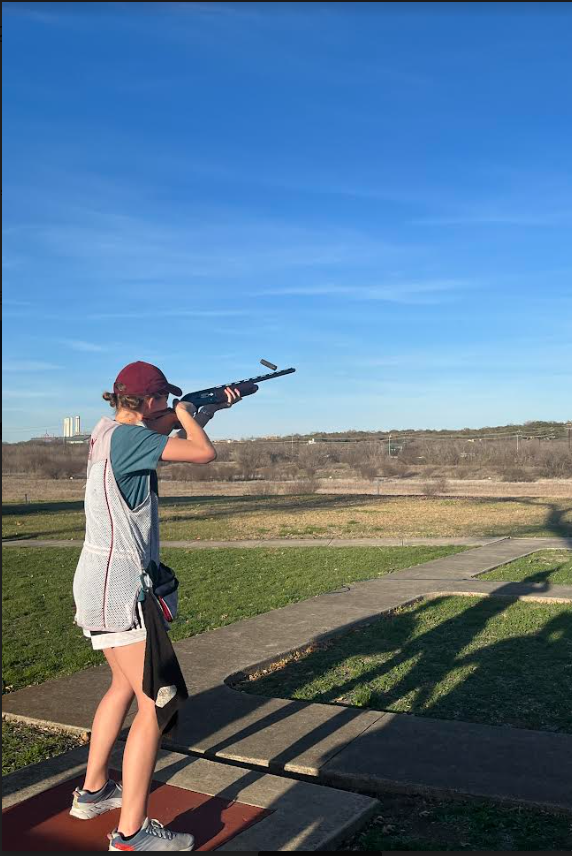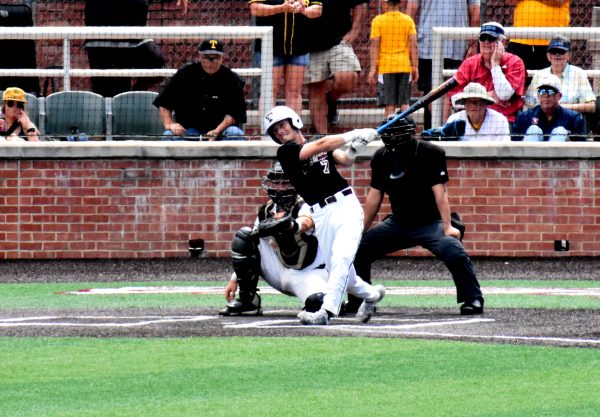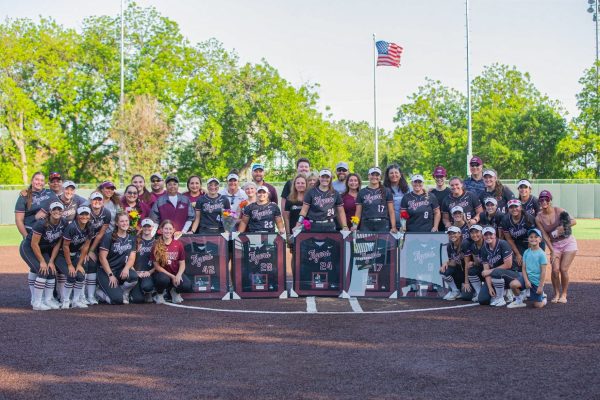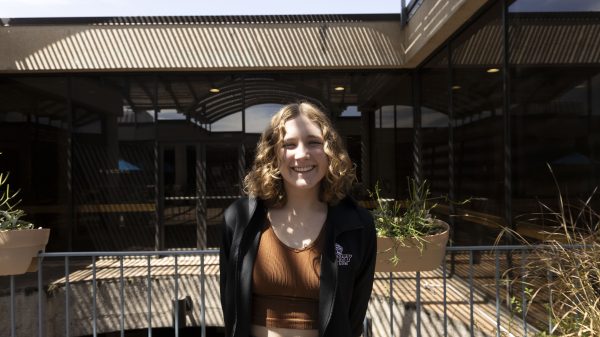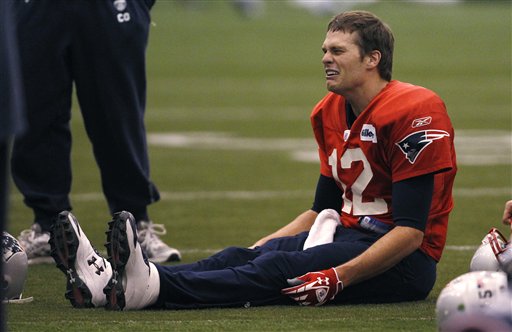Aiming for excellence
Trinity’s trap and skeet club team reflect on their storied history and the bright future of the program
Thea Suplis ejects an empty shell from her gun after shooting her target.
Trinity University’s club sports offer students the chance to participate in sports outside of the 18 varsity DIII teams, whether for fun, competition or a little of both. From soccer to triathlons to boxing, the range of sports available to students is vast, one overlooked example being the Tiger trap and skeet team, which currently competes in the third division of the Association of College Unions International (ACUI) under the direction of Van Boerner, the team’s coach.
The Trinity trap and skeet club competes in what is called clay target sports. Founded in the 1970s, the club teaches a variety of firearm skills to its members. However, according to Bennett Mach, sophomore computer science major, clay target sports is not so much about the shooting as it is the mental preparation going up to the shot. When describing what he wants to improve on for the rest of the season, he stated that mental focus is the key to victory.
“For the rest of the season, I am trying to focus on my mental game. Surprisingly, 90% of Trap and Skeet is in your head, hitting the target is the easy part. I really want to hone my focus so I can stay in the moment when I’m on the stand,” Mach said.
Throughout its history, the Tiger trap and skeet team has produced several star athletes. Of the several star athletes Boerner listed, two were placed into the Trinity University Hall of Fame. The first was Todd Bender from the class of 1982, a three-time National Collegiate Shooting Championship title winner. He was named the first Master Instructor for the National Skeet Shooting Association (NSSA) and was inducted into the Hall of Fame in 1999. The second was Bender’s coach, Tom “The Colonel” Hanzel, inducted in 2007. Hanzel led the team to four national championships in his tenure as a coach from 1970 to 1985. In that time, 40 individuals were ranked All-American, and six were named NSSA Hall of Famers.
Boerner, who recounted the club’s rich history, said that its members are not only proud to be a part of the legacy, but strive to continue such success.
“Trinity has had a longstanding history with clay target sports. The program dates back to the late 70s and early 80s. In fact, two of Trinity’s Athletics Hall of Fame members were affiliated with clay target sports,” Boerner said. “So the program dates way back, and it has existed continuously since then. So you’re looking at 40-plus years of this program’s existence.”
“Trinity has had a longstanding history with clay target sports. The program dates back to the late 70s and early 80s. In fact, two of Trinity’s Athletics Hall of Fame members were affiliated with clay target sports,” Boerner said. “So the program dates way back, and it has existed continuously since then. So you’re looking at 40-plus years of this program’s existence.”
Moving beyond its early glory days, Boerner said that the club has been stagnant with a lack of continuity in both coaching and membership. However, Boerner describes the past years as a renaissance for the team with support from alumni and friends of Trinity for the past seasons as well as fueling his vision for the future growth of the team. Presently, the team comprises nearly a dozen members, though few have previous experience shooting. Most on the team were recruited to the team after taking a developmental course that fulfills the physical education (PE) curriculum requirement.
“If you don’t come with experience, then you must show the tenacity and ability to learn shooting, which if you do, we put you into the developmental program. If you then show the capability to listen and learn, then you will eventually become a team member,” Boerner said. “So one of the options we offer is a beginner trap and skeet class as well as an advanced trap and skeet class. In the beginner class, we go over American trap and American skeet. Then in the advanced course, we go into the other six disciplines that we shoot at the collegiate level.”
With these methods, the Tigers are able to compete in both single and double American trap and skeet. Competitions typically take place outdoors, though Boerner noted that large crowds aren’t a norm, as teams take turns shooting targets. The team generally attends competitions during the fall semester, with a few more competitions in the spring. However, regardless of the season, the trap and skeet competition mentality remains distinct from that of many other team sports.
“It is a team sport, but it’s based on individual effort. What I mean by that is that clay target sports are individual games. It’s just you and the target, and what you do or fail to do depends on nobody else,” Boerner said. “No one person wins, and no one person loses. It’s never based on a bad pass or a missed free throw, it’s always about what you as an individual can do.”
This reliance on both individual ability and the collective team mentality creates an atmosphere that plays into the distinct needs of the team. Thea Suplis, sophomore biology major, describes the atmosphere of the team as both a friend group and a friendly competition. She noted that the strong bond formed between her and her teammates contributes to a relaxed social atmosphere, but retains a rigid focus on improvement.
“I would describe this team’s atmosphere as lively and supportive. There’s never a dull moment. I believe that the team’s collective goal is to not only advance our own abilities, but also to advance and build each other up,” Suplis said.
Such dynamics lead to members placing a high emphasis on self-improvement. Mach noted that it was much easier to compete alongside the team with the support from both his coach and teammates. Confident in this support, Mach stated that he wants to focus on perfecting every event he is competing in to ensure he consistently puts up points for his team.
“Before I go to Nationals, I want to get myself very comfortable with each discipline so I can eliminate any doubt in my head. I am by no means the best on the team, and I wouldn’t say that I am the best at any of the disciplines. I will say that I am exceeding on becoming more consistent and I can feel the work I put in paying off,” Mach said.
The trap and skeet club has an illustrious history with a team seeking to improve and continue that legacy for the future. As the national ACUI championship draws near, the Tiger trap and skeet team prepares for their next competition, held in the National Shooting Complex at 5931 Roft Road, San Antonio from March 20-25.
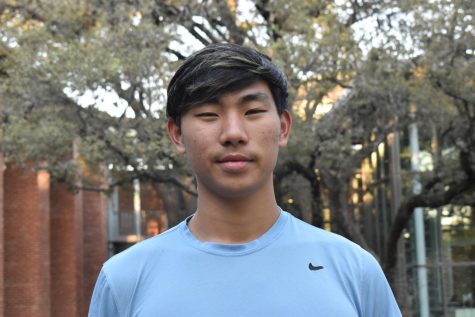
Hello, my name is Nicholas Chen. I'm a freshman who is a sports writer for the Trinitonian, joining in the 2022 to 2023 school year. My major is International...

